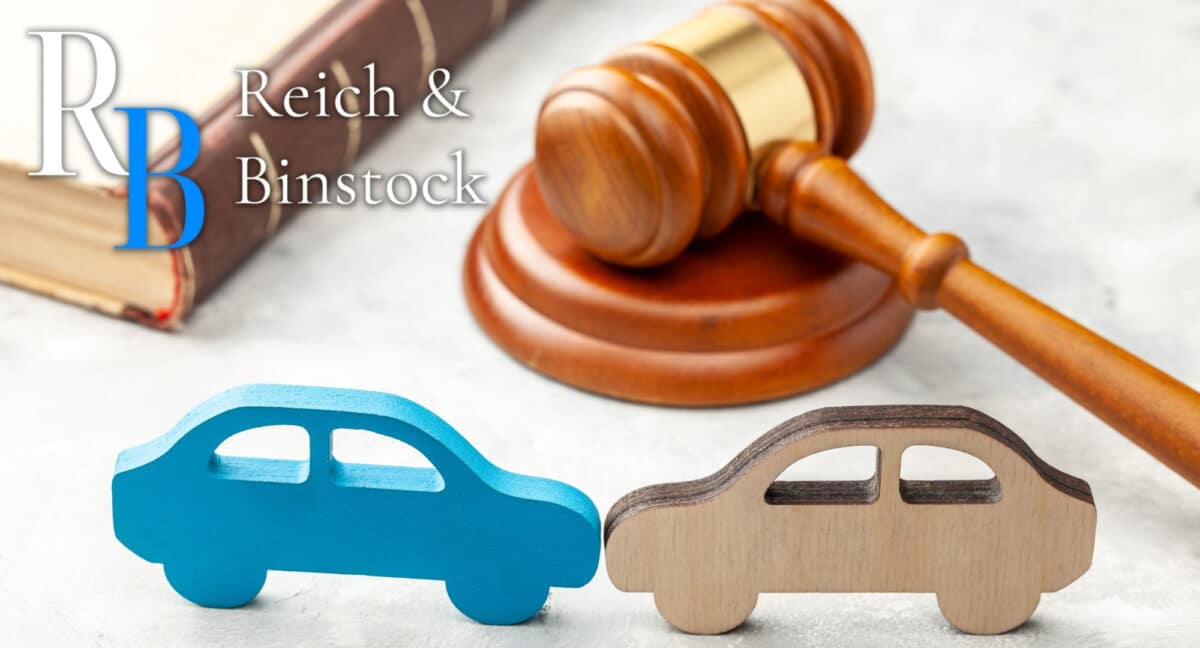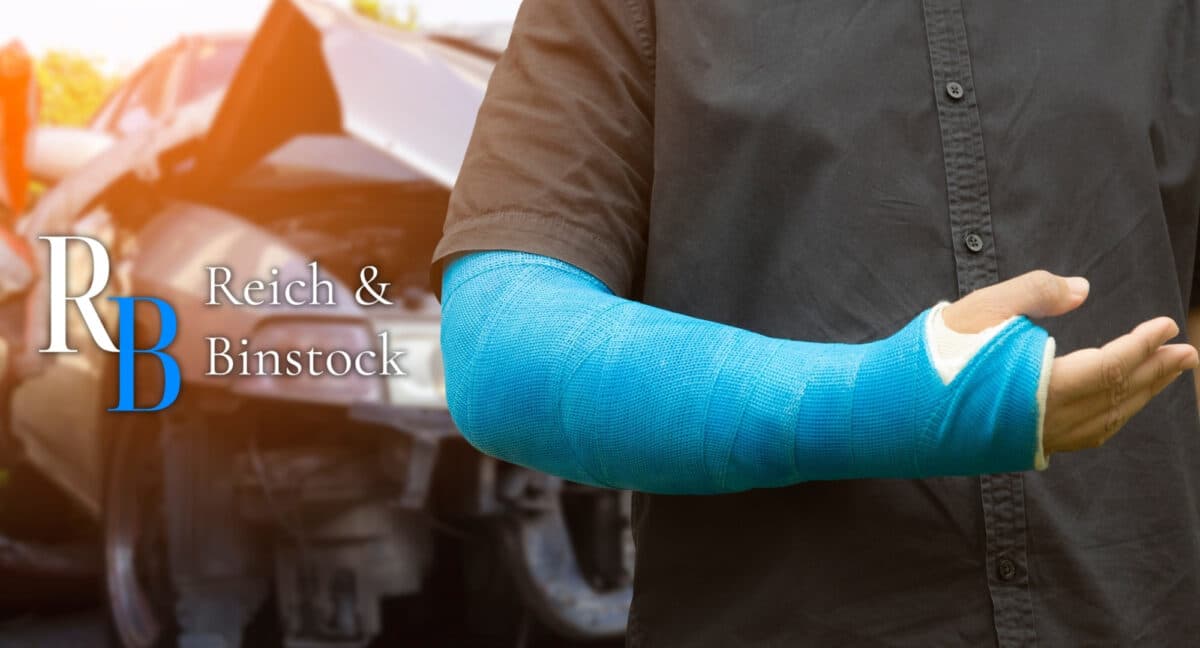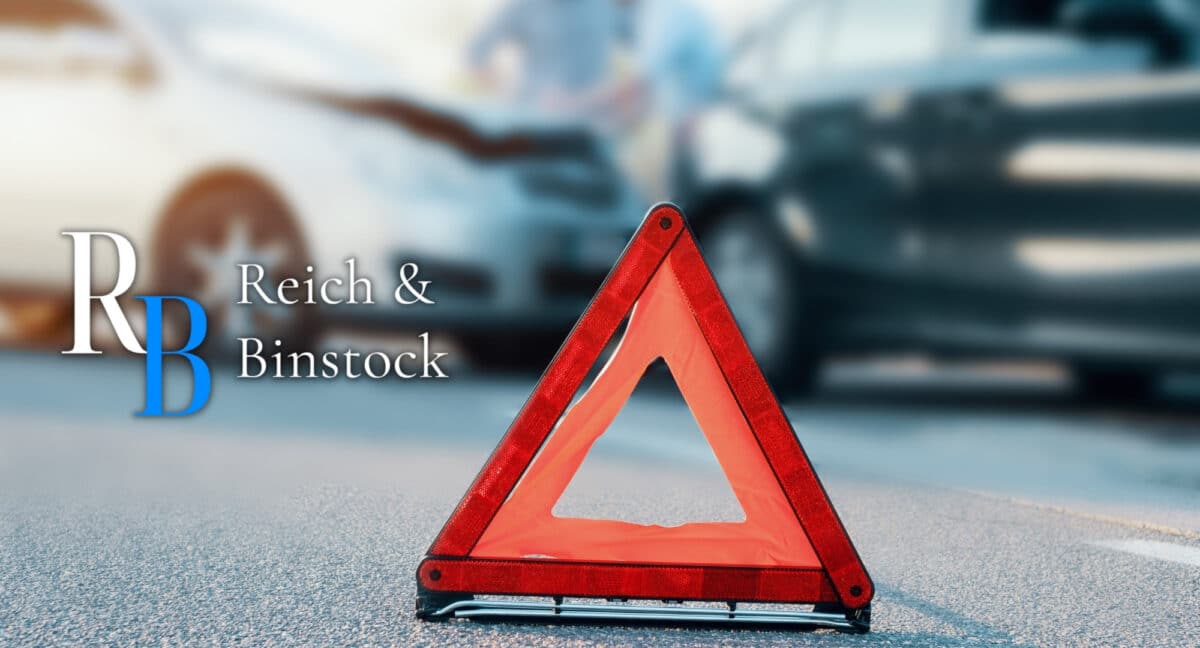Car accidents are stressful and traumatic events. Many involved in auto collisions feel the physical and mental after-effects for days, weeks, or in some cases, even longer. In addition, accident-related expenses such as medical bills and car repairs add up quickly. You may be left wondering who covers these charges. Will it be your health insurance, your vehicle insurance, the other driver’s car insurance provider, or some other entity? However, the most important question that you should be asking is: Is Texas a no-fault state?
Whether a state is a no-fault or an at-fault state determines who foots the bill for your accident damages. It isn’t fair that you should shoulder these financial burdens when you did nothing wrong. That’s why you need the Houston car accident lawyers at Reich & Binstock on your side.
Our dedicated legal team investigates your accident, gathers evidence, deals with insurance companies, and builds the strongest case possible. A free case evaluation is available to all of our new clients. Please contact us today to establish your attorney-client relationship with one of Houston’s premier personal injury law firms.
At-Fault State vs No-Fault State
There are two types of states in terms of the traditional fault based system used to file car accident claims: fault states and no-fault states. And, while uncommon, there are also a few that follow a hybrid form called partial fault or comparative fault. Knowing which model your state follows is essential to knowing where to begin when filing your car accident insurance claims for your Texas auto wreck.
Which type of state you live in determines whether you file an insurance claim with your own insurer or the at-fault driver’s insurance carrier. Injured persons must file personal injury claims with their insurance provider in no-fault states. It isn’t necessary to determine fault to recover compensation, but no-fault laws limit your ability to sue the liable party.
Personal injury protection (PIP) insurance is the minimum coverage required for all drivers in no-fault states. This is also known as liability insurance. With liability insurance coverage, a driver may seek compensation after a car wreck from their own insurance company.
Car accident victims in an at-fault state may sue a liable party for various losses. These include economic losses such as medical expenses and lost wages. These types of damages are tangible and easily quantifiable. Victims may also sue for non-economic losses, including pain and suffering and emotional distress.
So, is Texas a no fault state?
Texas is a fault or tort-based state, not a no-fault state. This system allows injured persons to seek compensation from the person who caused the accident. The insurance company of the at-fault driver pays for your damages. You may be able to personally sue the liable party for the difference if your damages exceed their policy limits.
What is Comparative Liability?
Texas also practices a concept known as comparative liability or partial fault liability. Under this form of Texas tort liability law, insurers may reduce the injured person’s damages if they contributed to the accident.
The injured party may not recover any compensation from the other person if assigned more than 50% of the fault. You may recover damages if you are allocated less than 50% of the responsibility. However, any award you receive gets reduced by an equal percentage of your fault.
For example, if the injured driver is assigned 20% of the fault, it would reduce their recovered damages by 20%.
What Are the Minimum Insurance Requirements in Texas?

All drivers must carry the required minimum insurance coverage in at-fault states like Texas. This amount equals:
- The amount of coverage for each person injured in the accident.
- A coverage amount for each accident.
- A coverage amount per accident for property damage.
The minimum coverage amounts in Texas are 30/60/25. This means:
- $30,000 – bodily injury per person
- $60,000 – total per accident
- $25,000 – property damage coverage
This insurance coverage protects all drivers involved in a wreck. It pays for the damages a driver incurs and ensures the other driver doesn’t have to pay out-of-pocket for damages.
What Happens If Damages Exceed the At-Fault Driver’s Insurance Coverage?
Injured persons have the right to file a claim against the at fault party for the difference, if the cost of their damages is more than the collision coverage provided by the other driver’s insurance coverage.
What If the At-Fault Driver is Uninsured?
There are still ways to recoup your damages if an at-fault driver is uninsured or underinsured. If you carry uninsured or underinsured motor insurance (UM/UIM), you can file a claim with your provider. This additional insurance is available as an add-on option on auto insurance policies.
Who Is At Fault in a Car Accident in Texas?

Injured drivers and their attorneys must provide evidence proving the other party’s liability. Evidence includes traffic cam video, police reports, accident scene photos, witness testimony, phone records, crash reconstruction reports, and more.
To recover damages in your personal injury claim, you’ll also need to prove damages. You’ll need to keep track of any expenses, such as medical bills, therapy costs, prescription expenses, and other financial burdens associated with your injuries. You may also need proof of any lost wages and repair bills for your vehicle damage.
The legal team at Reich & Binstock will investigate your case, gather evidence, and work tirelessly to prove the other driver’s fault. We offer a free case review to new clients hurt in an auto accident.
Can Someone Sue You For a Car Accident in Texas?

The person at fault for the auto collision can be held financially responsible for the damages they caused. The liable person’s insurance provider pays for the damages most of the time. But, there are some instances when a victim may file suit against the at-fault driver.
Some examples include:
- The injured person may sue for the difference when the total damages exceed the maximum coverage of the negligent party’s insurance policy.
- If the negligent driver’s insurance provider denies liability for the collision, the victim may sue the driver for their damages.
- The injured driver may sue for the maximum amount possible if the other driver’s insurance company refuses to negotiate a fair settlement.
How Long Do I Have to File After My Texas Car Accident?
The law in Texas allows injured parties two years from the date that the accident occurs to file suit for their personal injuries. If the injured party does not file within this time, they may lose the right to file for their damages.
What Damages Can I Recover After a Car Accident in Texas?

Working with a Houston personal injury attorney after your wreck is the best way to ensure you receive the full compensation you deserve. The details of your accident and your losses determine the types of damages you might receive, if you’re able to obtain compensation.
Economic damages are quantifiable financial losses a victim experienced because of an accident. Non-economic damages are harder to prove and include long-lasting effects caused by the crash, such as emotional trauma.
Examples of recoverable damages include:
- Vehicle repairs and property damage repairs
- Medical bills for expenses such as surgeries, medications, therapy, hospitalizations, emergency room charges, and more
- Past and future lost income and benefits
- Decreased earning capacity from a permanent impairment
- Physical, emotional, and mental pain and suffering
- Scars and disfigurement
- Disabilities and permanent impairments such as paralysis, traumatic brain injury, amputations, and other catastrophic injuries
- Loss of enjoyment of life
- PTSD, anxiety, and depression
- Wrongful death
Rely on an Experienced Texas Personal Injury Attorney
Evidence may be lost or destroyed, so an investigation must start as soon as possible after an auto accident. Proving fault is the key to recovering compensation for your Texas car accident injuries. The unrivaled personal injury attorneys at Reich & Binstock excel at maximizing our clients’ financial recovery and making them whole again.
Remember, the car insurance provider for the other party, as well as your own insurance company is a for-profit business. This means that you’re unlikely to receive a fair settlement from either, even if you are able to prove fault. Insurance agencies will always pay the minimum amount to those who are injured in auto accidents, that is–without the help of an experienced personal injury attorney.
If you sustained injuries in a Texas automobile accident, reach out to Reich & Binstock. Our Houston super lawyers gather the necessary evidence to prove fault and build a successful claim. Call our Houston personal injury law firm office today at (713) 622-7271 for a free consultation about your potential car accident claim.














